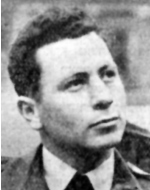Canter, Zeev (Wilfred)
Son of Hava (Eva) and Leon, was born on February 19, 1921 in the city of Kiev, Russia. At the age of five his parents emigrated to Canada and settled in Toronto. Where he completed elementary school and technical school. In August 1941 he enlisted in the Canadian Royal Air Force. He got his flying wings about a year later and was sent to England. Where he spent another year in pilot training. After finishing the course, he was sent to an active flight over Germany. In April 1943, his bomber was hit over the city of Stuttgart, Germany, and crashed. All the crew members were killed in the crash and he is the only survivor. His leg was broken during the jump and he lay in hiding for nine days. One family felt sorry for him and brought food to his hiding place. The underground helped him escape from Germany. He arrived in Gibraltar, then Switzerland, and from there he flew to Canada via England. After a month of rest he returned to his post in England and continued to fly and bomb Germany. In May 1944 his plane was hit again and he and two or three of his comrades managed to land safely. They were captured by the Germans in the vicinity of Dusseldorf. He was taken by the Gestapo for interrogation. “To this day I do not understand how I survived,” he told his mother, but he refused to tell the details. Wilfred was one of the organizers of the great escape from the POW camp in Germany, where fifty pilots were caught trying to escape and were executed. When they were caught, he had not yet managed to cross the tunnel under the fence of the camp. On the eve of the German occupation by the Allied army, the prisoners were marched eastward, inland. During this journey, Wilfred escaped, managed to connect to an advanced English unit and helped him to England. Where he was accepted for an interview with the king in his palace and received a medal of excellence (DFM). In 1945 he returned to his home in Canada. After his return, he could not rest in peace after all the trials and tribulations he had gone through and after everything he had seen. He arrived in Israel on August 5, 1948 with the first pilots and joined the 103rd squadron at the Ramat David base. He flew Dakota planes on supply missions to towns surrounded by the Egyptian army, as well as to Sodom, which was accessible by air only. Operation “Yoav” carried out bombing flights. Wilfred liked his comrades in the unit, who admired him as an outstanding pilot. He was one of five Jewish pilots from Canada with World War II combat experience who served in the Israel Air Force. On October 24, 1948, shortly before midnight, he took off from Sde Dov in Tel Aviv to Sodom with a supply charge. Ten minutes after take off, the right engine of his plane went up in flames. He changed direction, apparently in an attempt to reach the Tel Nof emergency landing site. The plane exploded in the air around a group of foundations near Tel Nof and crashed on the ground. All the crew of the plane had perished, and Wilfred among them. He was laid to rest in the military cemetery in Rehovot.
